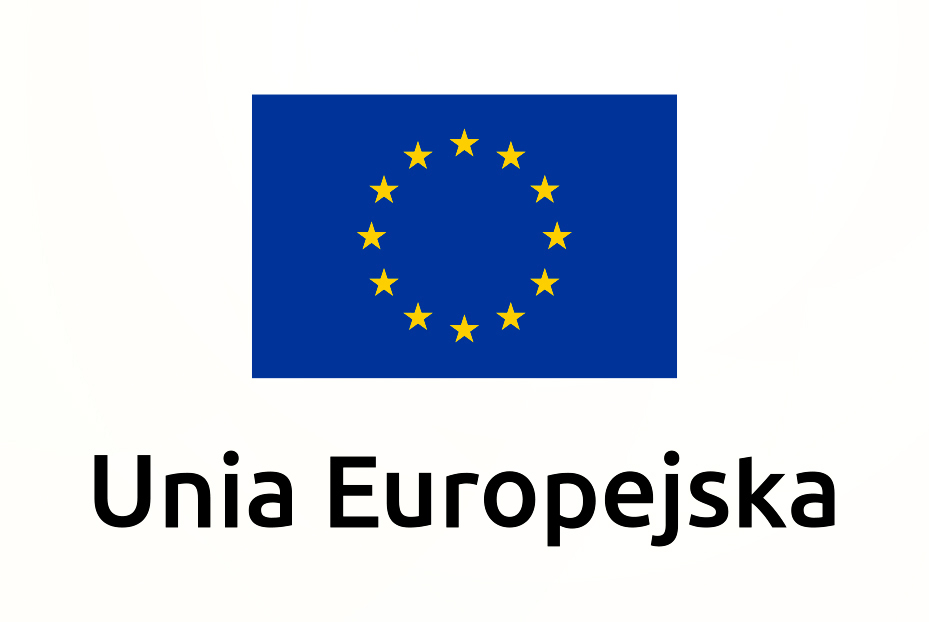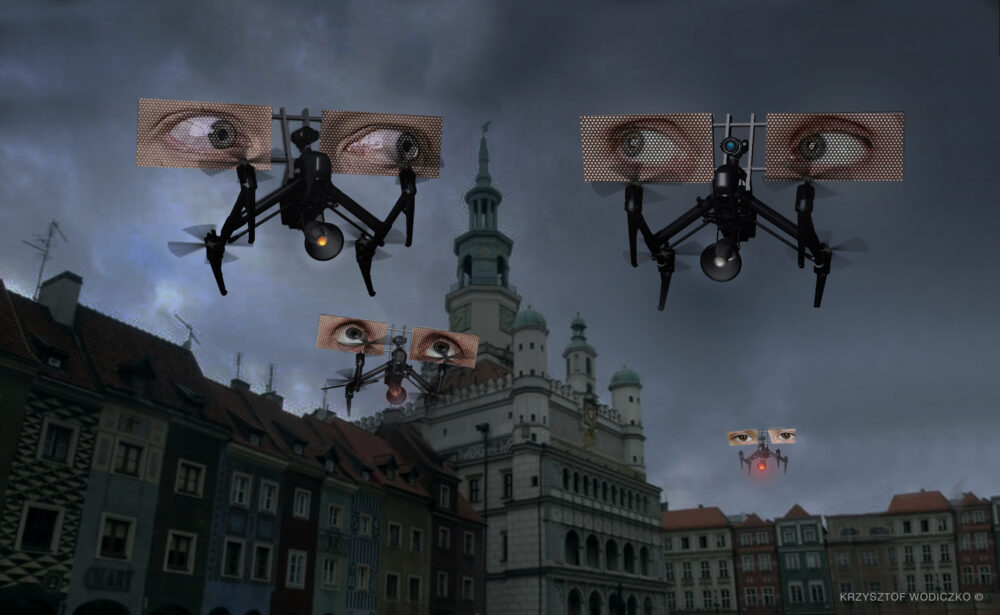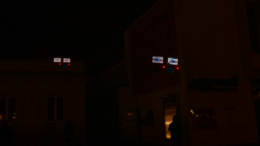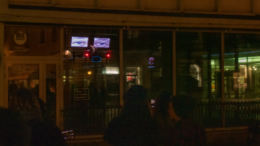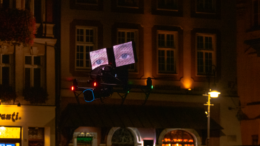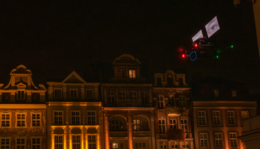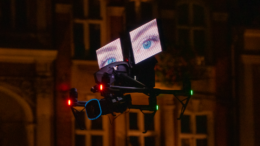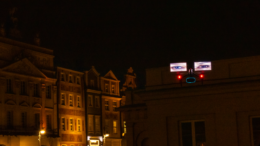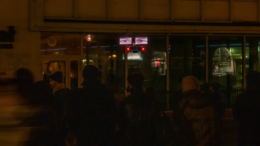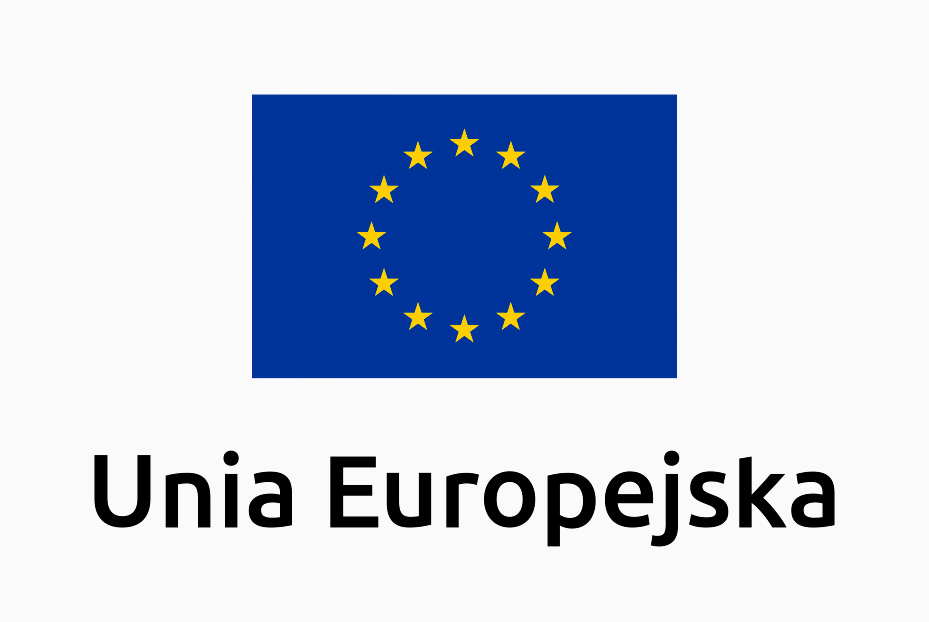Krzysztof Wodiczko is one of the best-known and most internationally acclaimed Polish artists. His works address vital social and cultural questions of contemporary global civilisation. His art projects are set within urban space, seen as a platform for public debate, for exploring historical memories and reading the current messages of the city. The artist reflects on the condition of contemporary democracy, believing that its quality is determined by its capacity to welcome strangers and care for the disadvantaged.
The Incomers art project, carried out in Poznań, uses drones specially adapted for this role in intercultural communication. The artist intends to use the unusual movement of the UAV to draw attention to people perceived as “aliens”, appearing “out of nowhere” in spaces we are familiar with. The introduction of unusual objects flying in the air is to draw attention to those who in our world try to be invisible, have no voice and cannot talk about themselves. Despite the dominant negative propaganda concerning immigrants in the media, they are a fixed and valuable element of Polish reality.
The artist comments on his actions as follows: “Art, by definition, in its essence, makes it possible to convey something that is frightening yet strangely familiar. This is because art is partly truth and partly fiction. If art finds an adequate form, you can create a situation in which people are faced with their own fears and their own absurd behaviour. It is an indirect rather than a direct message. In this way you can slowly come to terms, emotionally and intellectually, with your own position vis-à-vis other people, such as strangers. Especially if our own strangeness appears there as an element we have repressed. On the other hand, the artist can create opportunities, conditions and forms of communication for those who have no voice and no chance to express themselves, or to communicate their experiences and visions in a new society”.
The project involves immigrants from different countries and cultural backgrounds who have come to Poznań for a shorter or longer period of time. Some of them have been connected to the city for several decades, others have come here only recently. There are also Polish Muslims, who, although born in our country, are treated as strangers. The Incomers project gives them a voice.
Marek Wasilewski
Mercedes
Hello, my name is Mercedes. I’ve lived in Poznań for over forty years. My children were born here, and my entire family lives here as well. You could say that I am from Poznań, also because I’ve worked as a tourist guide here for many years. Over all these years, it’s been great living here… but in recent years, in the last two or three years, something has changed in the nation. I notice, with fear and concern, that people who were – until recently – very open, I mean strangers of course, especially young people … I guess these days they don’t look favourably on foreigners. And in our city – and I dare say our city, because I consider myself to be from Poznań now – this has never been the case. And to me, that’s a bit sad. I am also speaking on behalf of other foreigners who may not have the opportunity to talk about these matters.
Omar
Personally, as a second-generation Muslim in Poland, I believe that the best cure for hatred and fear is education, and I’d like people to want to ask questions. We are always open to questions and I want people to come and talk to us, because conversation in itself is always pleasant. I’d also like for my father, my sister who wears a headscarf, and me to not feel like guests in the country of which we are citizens, the country where we live and with which we really bind our hopes for the future. And this is really the most important thing for me – no one who loves this country and lives here in peace doesn't feel like a guest here, but feels at home.
Magda:
Hello, my name is Magda. I’m Muslim and I wish people would stop being scared of me. I’d also like to stop being afraid of showing who I am, because I am not ashamed of who I am. And I wish we were all treated as human beings, without any further definition, just as “humans”. I wish we would all stick together, support and respect each other. I am Polish and I love Poland, and I don’t want to be told to leave just because of what I look like. I’d like people to see it as my choice, because it is my choice, rather than judge me purely because of what I look like. I’d like people to get to know me and respect me, because I respect people, I respect everyone who is a good person. And this is the only difference in my opinion, I think people are either good and bad people. There are no other divisions.
Youssef:
As-salamu alaykum, peace be with you. I’m Muslim; I’ve lived here in Poland for a long time. I’ve a family and a lot of friends here. Why did I choose Poland? Because I just love this country, to me Poland is wonderful. In general, the Polish people are a tolerant, hospitable and respectful nation, but in recent years we’ve seen that, for example, racism, Islamophobia, and fascism are on the rise. Even the theory that white people are above other people is on the rise. History teaches us that segregation leads to disaster, hatred, and killing innocent people. Today, there is a lot of ignorance about Islam and Muslims, and if we look at these political manipulations and media brainwashing, we will find all these elements. They lead to hatred and killing of Muslims. Racism is a disease. No one is born racist, but becomes racist through bad education, manipulation, or brainwashing. You have to respect every human being.
Albara:
Good morning. My name is Albaraa Alanesi. I’ve been in Poland for six years. I came to Poland because my friend wanted us to finish our studies together. It was difficult to get to Poland. I’d no other choices, like France, or other countries that my dad wanted me to go to. Unfortunately, I chose the most difficult, but also one of the most beautiful countries – Poland. It is difficult because the language is difficult and because the tradition is different for me. I’ve encountered beautiful situations and also bad situations in the streets, related to marriage. I’ve encountered racism all the time. At first, people would yell at me in the street and I didn't understand what they were saying to me. At that point I didn’t really care because I’d my headphones, and I was listening to music and I didn’t care. And I thought that one day I’d speak Polish, I’d understand what people were saying to me in the trams and so on, and that wouldn’t be a problem at all. I figured maybe there was nothing wrong and that I just didn't understand. I went to an intensive Polish language course at Adam Mickiewicz [?]. The course wasn’t so easy, and I felt that I’d learned nothing. Later, I began to understand what was happening in the streets. Being a rapper, I also started to listen to Polish rap and feel what’s happening in Poznań and in Poland. Later it was a shock to me that people who are real and have such good heart can change after getting the message from the media and can beat up others. I never imagined that could happen. Later, I began to understand that people were swearing at me, and that their words are neither nice nor respectful towards my background. I was starting to feel bad, but from that moment on I decided to start doing training, workshops, so that I can connect with other people and explain what is going on, what the world looks like, and it is not what Poland looks like, it is not that “Poland is all white” as some say. This is a message that is simply not true.
Anastassija:
I am Anastassija. Just like Anastazja, but with an “s” and double “i”. I am from Ukraine, yes. Yes, I hardly have an accent. So, if I don't have an accent, why are you asking me where I'm from? I came to Poznań to study. And you, where are you from? Poznań as well? Or maybe you commute to Poznań every day from somewhere, then you are also kind of a migrant, a local migrant….
Hacen:
My name is Hacen Sahaoui. I am French and Algerian, born in France, near Lyon. I studied in Lyon, worked in Paris, but I live in Poland. At first, I felt like a “tourist”. Everything was nice, warm, delicious, and pleasant. People were open, interested, interesting, but there was a barrier. Language. I didn't know the language and I didn't know the culture, and to understand the culture, I’d to work more. I studied Polish. It was very difficult. I still have to work on it. I still have that French accent. Even if I work a lot on the accent, on my Polish accent, I’ll still be a foreigner anyway, whether I live here for twenty or thirty years. For the rest of my life, I’ll be a foreigner, a migrant, but I feel good here. I've heard some people had problems, but I'm fine. I don't look like a Pole, but I wouldn’t like to look like a Pole in order to fit in. I like the difference. Maybe that's why I'm not in France right now. Difference. That's why I like to be here, to live with you here. Now I can feel what it means to be different. When I was in France, there were some problems, and I felt French, but I wasn't proud of myself. My identity wasn’t interesting, and here I am happy, confident, I feel good. I am not ashamed to be French, Algerian, to be a mix. Here I can say that I am from Algeria, France and that is not an issue for me. For me, being different is a treasure that can be discovered …
Lesia:
My name is Lesia, I am an artist from Belarus. I was forced to leave Belarus four months ago. I’ve been in Poland for about a month. I took an active part in the protests. I was imprisoned because of that, and now I cannot go back to Belarus, I cannot meet my family. Poland wasn’t my choice, but it was the best place for me because I’d a visa and I knew the language. Here I met people who work in culture and who are involved in protest activities. The treatment I get is normal, a little colonial, but generally OK. I’ve not been in Poland for a long time, so I cannot productively answer the question about what I’d like to change, but the total ban on abortion is savage.
Edyta
Hello, my name is Edyta. I am a Muslim, a convert. I’d like to say that since I started to be interested in Islam, I also noticed that Christianity and Islam have a lot in common. Let me start by saying: John Paul II even wrote a book, Crossing the Threshold of Hope, where one entire chapter is devoted to the Prophet Mohamed, the last prophet of Islam. Also in 1965 the Vatican Council declared interreligious dialogue between Christians and other religions, including Islam. That is why I think that people who practice monotheistic religions should somehow be able to coexist. Islam is not a foreign religion, it is not a radically different religion; religions are similar I believe that people should at least learn to tolerate each other, I am not talking about some kind of mutual love, but at the very least tolerance. So I’d like to repeat that there are really many similarities between religions, it is all about faith in one God and the same prophets. I think that if there are common elements, then these similarities help and in the future will help people build bridges to each other, aid mutual relations, and I hope that the world will be a better place.
Volodya:
Hi, I'm Włodek or Włodzimierz, or Wołodia. I was born in Minsk, in Belarus. I've been living in Poland for two months now. I was involved in protests in Belarus, and because of the repressions and everything that is going on, I’ve left, I cannot stay at home any longer. I feel normal in Poland; of course I’ve a lot of nice people and friends. I don't know what’ll happen next, but it seems to me that with each month I feel like I am closer to my friends and neighbours. On the other hand, it seems to me that this may be my home for some unfathomable time. I don't know what will happen in the future, or whether the people here will still want me here. When the situation in Belarus resolves, when the protests lead to the regime’s collapse, I’d like the people who live here now to be able to stay, so that anyone can choose to live here, regardless of what happens in their homeland. I’d like there to be fewer racists and sexists in Poland, but I think this is also a problem in other countries. If there were fewer people who hate other, different people, it would be nice and everyone would have a better life.
Nastya:
Good morning, my name is Nastya. I come from the city of Donetsk in eastern Ukraine. There is a war going on in my city, but that doesn't mean I'm a refugee. For the last five years I’ve lived in different cities and I try to get to know different cultures, different attitudes, and I’ll say that out of the five cities I’ve lived in, I like Poznań the best, because here you have a pleasant atmosphere, good mind-set, and it is easy to adapt to how people live here. There is no difficulty with living a better life here - it can be done. If you are a good person, you can surround yourself with good people who can always help you out. I work in a printing house, right now I'm doing screen printing, but before that, one year ago, when I first came to work here, I was doing packaging, and it was very hard, physical work. But if you show yourself as someone who works hard, who is willing to learn, then the employer can notice it, and you can get a raise. You can get a promotion if you are not just sitting around being lazy but are trying hard to make sure everything goes well in the company. You do whatever can be done. What else can I say? I am in a relationship with a Pole, and I am surprised at my relationship with his family; with his mum and dad in general. I’ve such a good relationship with his parents that his brother is jealous, because he would like to have that too, but unfortunately he doesn't. My mother is quite surprised that I am staying here permanently, that I try to integrate into this culture. When it comes to the fact that I am from Ukraine and from a city that is in the east, and now I am in Poznań, there are many, many, many kilometres from my city to Poznań and my mother is afraid that we live so far from each other.
Kirill:
Hello, my name is Kirył, I'm 21 years old, and I'm from Belarus. I moved to Poland in October 2020 after the presidential election in my country. Now I'm fine, I like Warsaw and Poland in general. I don't feel like a stranger here, we do have a lot in common, after all. I mean the mentality of Poles and Belarusians. Since I moved here, I’ve been living in Warsaw. I already have a few Polish friends, they help me adapt, and I am very grateful for that. Generally, people treat me well, my neighbour even wanted to give us her sofa, because she bought a new one. I noticed that Poles are open to change, but not all of them. And I’d like to change that. Some people lack tolerance. I see it from their attitude towards others. I hope this is just the beginning of my adventure in Poland.
Olena
Dobroho dnia! Hello, my name is Olena. I am from the most eastern part of Ukraine, from Donbas. I partly grew up in the Crimea. My father’s family comes from the part of Ukraine that was previously called Bessarabia, that is, the southwestern part of Ukraine. And now I’m in Poland, I don't know for how long. I came here to observe and work with culture and art. I remember that moment when I came here in 2016 to Poland, which I didn't really know, and I imagined that there was West here, and then the sea. And now Poland turned out to be in my life. Because I am, I repeat, from the East. The subject of Polish-Ukrainian communications and relations is the domain of Western Ukraine, for us - living further away from the Dnieper - it was a bit different. I came because I really loved Polish theatre and thought that there was great democratic and liberal progress. I came here, I met some people, and they told me, “You know what Olena, you're a little late. Because now our freedom and progress has come to an end, and all the beautiful things that you have heard about are taking a huge step back ”. And now I can see with my own eyes how this process is taking place, people are losing rights in this country; women have to fight for their independence, for their most basic rights and how diversity is perceived now. It saddens me that I found myself in Poland in these dark times and I sincerely wish Poland that these times will become more colourful and diverse and that you will not be in a situation in which you now find yourself following this huge wave of solidarity, understanding, and development. And you have to make tremendous progress again so that people like me can feel better here, rather than feel like a worse kind of people, people who cannot say anything, or people who have to live in fear, who have to worry about papers and documents, fight for the right to stay here in such a humiliating way. I’d very much like Poland to be a country that welcomes others, respects its own people and others. I hope this will happen in the next few years. Show solidarity with your closest and distant neighbours. Remember that we cannot survive otherwise.
Abdul:
Hey, how are you doing, my name is Abdul Moket. I am originally from Bangladesh. I am staying in Poland for three years. I really like Poland, the weather is very good. You have proper seasons. The people here are very nice. I have come here to start my own business. My wife is from Poland. We thought we will come and stay here because of the climate, the people are very calm.
Kristina:
Hi, I'm Kristina. I came to Poland eight years ago, from the city of Baranovichi in Belarus, to study. I finished my MA and BA. When I arrived in Poznań, I was alone. I didn't have any friends, no family next door; I was 800 kilometres away from my family. Here, I only had a brother who was studying in another city. But in Poznań, there was my host family, with whom I stayed during an exchange 13 years ago. Thanks to this family, I always had support, I felt at ease, and then thanks to this family I had a lot of contacts, so I never had any problems finding work in Poznań. Then I moved to Warsaw and finding a job wasn’t too difficult either. I feel very comfortable here. I do not intend to return to Belarus. Many of my friends also come here because I tell them how I feel here, how I am treated. I’ve never had any issues or been mistreated by Poles. What would I change? Nothing, really, it’s great living here, so I’m going to stay!
Arda:
To live in Poland is nice. People are smiley. But a little bit different is when you are going to restaurant you can’t see this smiley and happy faces. But I love to drink with Polish people because they are so funny, so friendly. The hard thing for me is weather, because Poland is very cold in winter. In Turkey in winter you are not cold. In the summer Poland can be very hot. Last summer I was in Poland it was like 40 degrees and I was feeling like at home.
